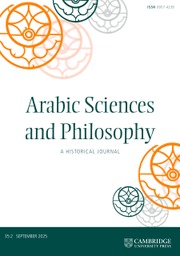No CrossRef data available.
Article contents
RELATION AS KEY TO GOD'S KNOWLEDGE OF PARTICULARS IN THE TAHĀFUT AL-TAHĀFUT AND THE ḌAMĪMA: A CROSS-TALK BETWEEN AVERROES, AL-ĠAZĀLĪ AND AVICENNA
Published online by Cambridge University Press: 20 February 2020
Abstract
This article deals with the divine knowledge of particulars in Averroes’ Tahāfut al-tahāfut and Ḍamīma. It examines how the concept of relation, generally neglected, is at the heart of the dispute between Avicenna, al-Ġazālī, and the Commentator. In al-Ġazālī’s eyes, Avicenna's misconception of divine knowledge “in a universal way” is based on a misuse of relation in the case of God's knowledge. If particulars change and God does not, his knowledge of particulars, insofar as it undergoes change, can be considered a pure relation without ontological consequences. Averroes contests both al-Ġazālī’s criticism and his proposal, despite the fact that, for different reasons involving the coming-to-be of human knowledge, he too employs the notion of pure relation in his Long Commentary on the Physics.
Résumé
L'article porte sur la science divine des singuliers dans le Tahāfut al-tahāfut et la Ḍamīma d'Averroès. Il examine comment le concept de relation, généralement négligé, intervient au coeur de la dispute entre Avicenne, al-Ġazālī et le Cordouan. Aux yeux d'al-Ġazālī, Avicenne tire sa conception fautive d'une connaissance divine « par mode universel » d'un mauvais usage de la relation dans le cas de la science de Dieu. Si le singulier change et que Dieu, lui, ne change pas, l'idée serait d'envisager sa connaissance du singulier, en tant qu'il change, comme une relation pure, sans conséquence ontologique. Averroès conteste à la fois la critique d'al-Ġazālī et sa proposition, même si, d'un autre point de vue (le surgissement de la connaissance dans l'intellect humain), il recourt lui aussi à la relation pure dans son commentaire de la Physique.
- Type
- Research Article
- Information
- Copyright
- Copyright © The Author, 2020. Published by Cambridge University Press




